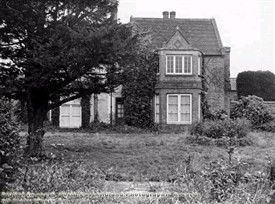Bingham in 1897

The Rectory was demolished in 1964 and Robert Miles Junior School built on site.
Photographed by George L Roberts, 1963. Image from Picture the Past, www.picturethepast.org.uk (reproduced with permission).
Down memory lane after twenty years of absence
By Betty Rose
In the June 1897 edition of Notts & Derbyshire Notes and Queries 'W. S. L.' submitted the following reminiscence. The author captures a moment in time, contrasting the rapid growth of the industrial centres of the East Midlands, such as Nottingham and Derby, with sleepy market towns such as Bingham. Ironically we have now come full circle, properties in a historic market town such as Bingham being more desirable than city dwellings.
"Bingham : after twenty years. — One has many a fond dream rudely dispelled by re-visiting the scenes of youth. It was my experience last Saturday to journey to the little country town where my early days were spent. It was the first time I had been there for close upon 20 years. How small and different from what I had thought it was everything appeared. The railway station, which I used to consider quite an imposing place, was merely a one-horse affair, and the cricket field hard by, which had bulked largely in my mind, was but a circumscribed croft. The town itself was only a village with commonplace streets, and the houses of the gentry, which I was wont to look upon with awe and reverence, were nothing comparable to the grand dwellings of the opulent butchers, bakers, and candlestick-makers of such a centre of industry and population as Derby or Nottingham. Picturesque old cottages I had known as a lad had been elbowed out of existence by new spick-and-span terraced houses. The pond on which I had skated many a winter years ago had been filled up, and its site was covered with an unkempt, uncared for garden growth. Two towered windmills of former days had been completely wiped off the surface. The old red-brick rectory where Robert Lowe (Lord Sherborne) was born, which I used to consider such a magnificent mansion, looked quite disproportionate, and the surrounding gardens and grounds, wherein I often had the pleasure of wandering by the favour of my kindest friend, the dear old rector, now no more, seemed to be of only an ordinary character. The schoolhouse, where I was birched along the flowery paths of knowledge, was the veriest dwelling-house sort of place compared with similar institutions in Nottingham and Derby, and the schoolmaster's residence and garden were desolate and neglected. Only the grand old church remained the same. Its clock-chimes struck the one connecting note between the past and the present to me. The grey, lichened walls, here and there creeper-covered, the fine and sturdy tower were strangely and affectionately familiar, and the beautiful interior, embellished in woodwork and painting by the clever wife of the late rector and their artistic children, filled one with that "feeling of sadness and longing" to which Longfellow alludes. Tall grasses waved in the churchyard, where on modest headstones I read the names of friends of bygone days, and rose bushes and tall lilies shed around sweetest odours, while in the circumambient trees the fresh breeze sounded like the breaking of the sea on a shingly shore. Altogether, my experiences were somewhat depressing, and I should not advise my readers to repeat it unless
they have relatives or friends on the spot, which, of course, would make all the difference. In my case, I was seemingly in "a land that knew not Joseph.""
W. S. L. Derby.
* * *
Notts & Derbyshire Notes and Queries, June 1897, pp. 94-95